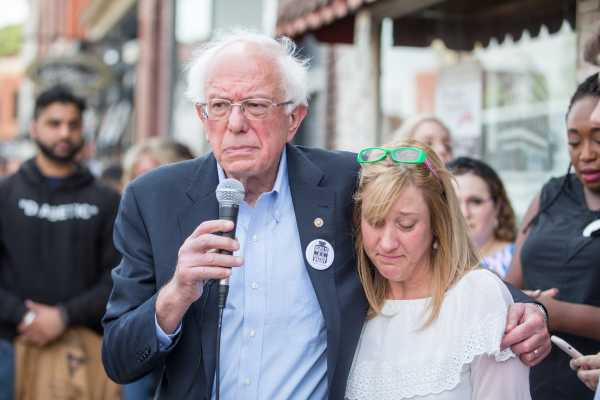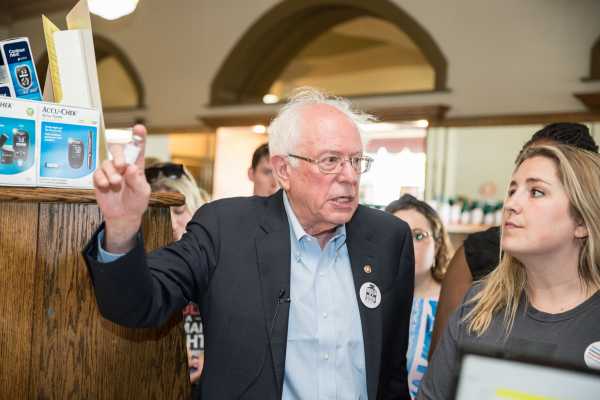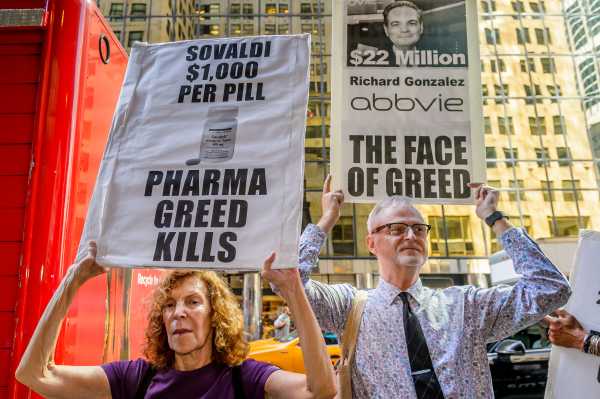
WINDSOR, Canada — Two days before the second Democratic presidential debates, Sen. Bernie Sanders bused roughly a dozen Americans across the border from Detroit to Windsor to prove his point.
They went to buy insulin at one-tenth the price it’s sold in the United States. Sanders, holding up a vial of insulin outside a Canadian pharmacy, surrounded by Americans struggling to stay alive and pay the bills, decried greed, corruption, and corporate profiteering.
The vial would cost around $340 in the United States, but it was $36 over the counter in Windsor, the result of more vigorous government price controls. Sanders said pharmaceutical executives who price-fix drugs should go to jail. Dozens of members of the press were on the trip; his campaign fundraised off it. Sunday’s trip was clearly political.
But it wasn’t political in the way Sanders usually is. He made no mention of Medicare-for-all. The Americans on the bus didn’t know Sanders’s campaign was paying for the trip when they signed up for it; the advocacy group Insulin for All, which helped find diabetics for the bus ride, designed it that way. Several of the participants didn’t even know what Sanders was about.
“I honestly have no opinion about Bernie Sanders except that if he can help us, he’s my guy,” Rachael Lockwood of Grand Rapids, Michigan, who brought her three school-age children, all with Type 1 diabetes, on the trip. She voted for Donald Trump in 2016. “I actually don’t really know much about Bernie’s [Medicare-for-all] plan.”
Sanders has set a firmly left-wing agenda — one that his critics describe as politically challenging at best, and otherwise legislatively doomed. He has a suite of proposals aimed at lowering prescription drug costs, among which, as Vox’s Dylan Scott explained, is one that would use foreign countries’ drug prices to push drugmakers to lower costs in the United States. Because Sanders, like many others, knows going to the pharmacy to get medication is so universal in America: You get up to the counter, fill your order, and pull out your wallet. Doubly familiar is the feeling of getting ripped off.
On the bus Sunday, Sanders put this message in real terms. His messengers are people like Kathy Sego, an Indiana mother whose 22-year-old son Hunter has Type 1 diabetes, who came home having saved $10,000.
“$1,000 today got me six months of insulin for my son,” Sego said, crying, outside the pharmacy. “That’s still less than what we pay for one month in the United States.”
Why America’s drug prices are too high, briefly explained

The United States has the highest drug prices in the world. There are a couple of reasons why, as Sarah Kliff explained for Vox. For one, American drugmakers are allowed to set their own prices; the government does not have any price controls or caps and is not allowed to negotiate with drug companies directly.
That means, second, hundreds of private insurance companies have to negotiate prices with drug companies separately, through pharmacy benefit managers. Drugmakers have an advantage in negotiating with these assorted payers, compared to other countries like Canada where the government represents all patients to set a price. Medicare, the government insurance program for seniors, is legally barred from negotiating drug prices.
The United States also allows any kind of drug that’s deemed safe to come on the market — even if it has little additional health benefit to what’s currently available. So there are many very expensive drugs that don’t provide a lot of value for those higher costs.
Finally, the American system often gives drugmakers either genuine or effective monopolies for their treatments, and therefore grants them incredible power over the cost. For example, just three companies control the insulin market — and have since the drug was invented in 1921.
Drug companies say prices are high to pay for research and development; if they made less profit, then investors would be less interested in backing innovative cures. But that doesn’t explain why prices for insulin — a drug that hasn’t dramatically improved — keep going up. One prescription drug sold in the United States, NovoLog, which people with Type 1 diabetes (and some with Type 2) need to survive, went up 353 percent in price between 2001 to 2016. Even at Canadian prices, it’s still turning a profit for drugmakers.
People with Type 1 diabetes paid an average of $5,705 for insulin in 2016, according to the Health Care Cost Institute. As Vox’s Julia Belluz reported, one in four people with diabetes are skimping on or skipping lifesaving doses.
“Insulin as a drug has been around for many decades, and the prices keep going up in an unsustainable way,” said Rachel Sachs, a law professor with Washington University in St. Louis. “We hear the most of any drug, of people rationing insulin.”
There’s an understanding across political parties that something is deeply wrong with this picture. Drug prices are going up. Sick people can’t afford them. And in turn, they’re getting sicker.
A powerful industry at the center of a debate

Drug prices like the ones in the insulin market, both parties agree, are clearly creating a crisis. Neither Republicans nor Democrats say this is sustainable. But despite Trump’s campaign promise in 2016, meaningful action on drug prices has yet to materialize.
House Democratic leaders are pushing a proposal that would allow for the government to negotiate prices under Medicare. Several presidential candidates, including former Vice President Joe Biden and Sens. Amy Klobuchar, Sanders, and Kamala Harris, have all endorsed policy around importing FDA-approved drugs from overseas.
The debate is most real in the Senate, where Finance Committee leaders Sen. Chuck Grassley (R-IA) and Ron Wyden (D-OR) unveiled a bipartisan proposal last week that would put price caps on prescriptions under Medicare. It’s projected to save $27 billion in out-of-pocket costs and $5 billion in premium spending for Medicare recipients. The bill has Trump’s support but hasn’t found consensus among Republican lawmakers. It still signals a shift.
“It is a big change to see Republican senators supporting a bill that would attempt to limit price increases in Medicare,” Sachs said. “This is a big change from even a year ago.”
Sanders is less optimistic.
“Trump talks a big game, but we are going nowhere near where we have to go,” he told Vox, sitting in the back of the bus in Canada.
He knows the power of the drug industry firsthand. In 2000, as a member of the House, he championed legislation supported by President Bill Clinton that created an importation program between the United States and Canada. It passed, as an amendment in a larger agricultural funding bill. But the health and human services secretary (who is now a House lawmaker), Donna Shalala, didn’t implement it. Republicans had managed to win a major concession to the legislation that seriously reduced its scope, and Shalala echoed a pharmaceutical company talking point: that drugs from overseas aren’t safe.
Even there, there has been some pushback from the industry. They say there is concern that Canada’s drug industry could not support a nationwide importation program. Canada, after all, is a much smaller country. And needless to say, drugmakers in the United States are adamantly against any importation policy that would push them to lower prices.
“It never ends,” Sanders said of the continued crisis. “The greed of the pharmaceutical industry — the corruption of the pharmaceutical industry — is scandalous and we have got to take them on.”
Bernie Sanders’s message ultimately comes back to his core theme: America versus the powerful
Twenty years ago, Sanders took a trip to Canada with a group of women with breast cancer, again to buy medication at one-tenth the price it was in the United States. Nothing has changed.
“What you are talking about is extraordinary greed,” Sanders said. “It is not quite clear to me how executives at a company can sit down and charge these types of prices to people who are in fact dying.”
This is a familiar frame for Sanders. The greed of Wall Street. The greed of big tech companies, pharmaceutical companies, private health insurance, the fossil fuel industry, the military industrial complex.
Sanders’s message is the same on prescription drugs. But this time, he had a different messenger.
“I stand before you as a teacher who has had her electricity turned off more than twice,” Sego told a row of news cameras. “How do I [pay] for the medicine I have to have to keep my son alive? We make hard decisions. We say, okay, we won’t pay the electric bill this month, but we will catch up next month.”
Sego isn’t a campaign surrogate. She’s not a single-payer advocate. That’s the point.
Sourse: vox.com






